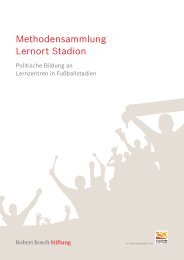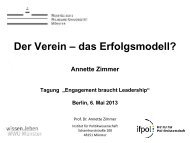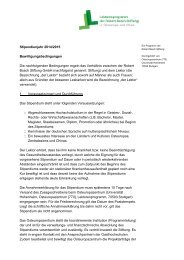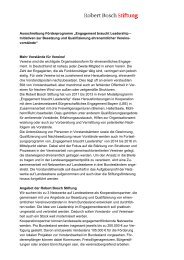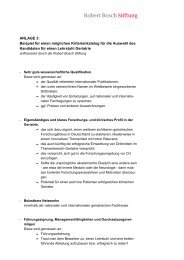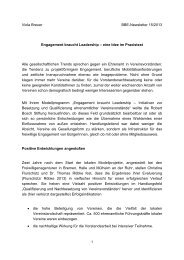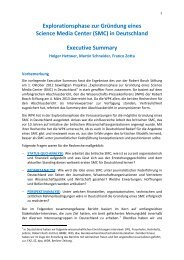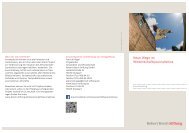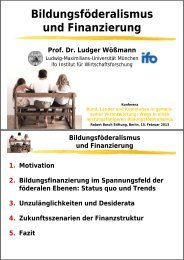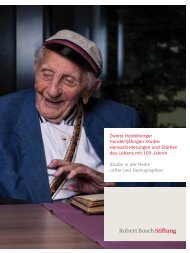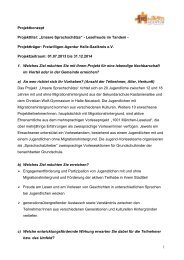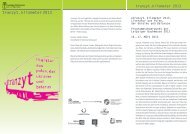Turkey, Its Neighbors and the West - Robert Bosch Stiftung
Turkey, Its Neighbors and the West - Robert Bosch Stiftung
Turkey, Its Neighbors and the West - Robert Bosch Stiftung
You also want an ePaper? Increase the reach of your titles
YUMPU automatically turns print PDFs into web optimized ePapers that Google loves.
BOx 3<br />
A Privileged Partnership Between <strong>Turkey</strong> <strong>and</strong> <strong>the</strong> EU: What Does It Mean?<br />
By Kemal Kiri¸sci <strong>and</strong> Nathalie Tocci<br />
opponents of Turkish membership to <strong>the</strong> eu have been advocating <strong>the</strong> notion of a “privileged partnership” as an alternative. In both<br />
<strong>Turkey</strong> <strong>and</strong> <strong>the</strong> eu, many have rejected this idea, arguing that such a relationship already exists <strong>and</strong> that <strong>the</strong> actual content of <strong>the</strong><br />
“relationship” being offered remains terribly vague. Indeed, <strong>the</strong>re are no specific proposals that articulate what such a relationship<br />
might entail.<br />
More importantly, <strong>the</strong> existing “privileged partnership” in <strong>the</strong> form of <strong>the</strong> eu-<strong>Turkey</strong> Customs union is not a privileged relationship<br />
at all. It allows eu business people to travel to <strong>Turkey</strong> freely, while enabling Turkish goods (such as consumer durables, cars, buses,<br />
textiles, etc.) to enter <strong>the</strong> eu. While <strong>the</strong> same cannot be said about Turkish businessmen (let alone all citizens), who are prevented<br />
by <strong>the</strong> schengen visa requirements from traveling hassle free to europe to promote <strong>the</strong>ir products.<br />
fur<strong>the</strong>rmore, <strong>the</strong> Customs union requires <strong>Turkey</strong> to implement <strong>the</strong> eu’s Common external Tariff. This works to <strong>the</strong> disadvantage of<br />
<strong>Turkey</strong>, especially when <strong>the</strong> eu signs free trade agreements with third-party countries. In such cases, <strong>Turkey</strong> is bound to implement<br />
<strong>the</strong> terms of <strong>the</strong>se agreements, but third-party countries are not obliged to open <strong>the</strong>ir markets to <strong>Turkey</strong>. This penalizes Turkish<br />
business enormously <strong>and</strong> prevents it from competing for a fair share of third country markets. Ironically, this has helped spur <strong>Turkey</strong>’s<br />
recent entrance into markets in its immediate neighborhood, as well as in africa <strong>and</strong> asia.<br />
If advocates of a “privileged partnership” with <strong>Turkey</strong> hope to advance <strong>the</strong>ir cause, <strong>the</strong>y need to address <strong>the</strong>se problems first. Turkish<br />
officials <strong>and</strong> business interests argue that <strong>Turkey</strong> accepted <strong>the</strong> imbalance present in <strong>the</strong> Customs union agreement only with <strong>the</strong><br />
underst<strong>and</strong>ing that it represented a first step toward full membership. In <strong>the</strong> absence of membership, <strong>the</strong> imbalance becomes a<br />
burden, <strong>and</strong> an additional source of distrust with <strong>the</strong> eu.<br />
finally, proponents of <strong>the</strong> “privileged partnership” argument undermine <strong>the</strong> credibility <strong>and</strong> effectiveness of <strong>Turkey</strong>’s eu accession<br />
process, which, to date, remains <strong>the</strong> only framework in which eu-<strong>Turkey</strong> relations exist. <strong>Turkey</strong> does not have a “right to membership.”<br />
Yet, it does have a right to being treated according to <strong>the</strong> eu’s norms, rules, <strong>and</strong> procedures as determined by <strong>Turkey</strong>’s accession<br />
negotiations framework, which stipulates that, as with o<strong>the</strong>r c<strong>and</strong>idates, <strong>Turkey</strong>’s negotiations are “open-ended.”<br />
C H A P T E R5<br />
Yet <strong>the</strong> open-endedness of <strong>the</strong> process <strong>and</strong> <strong>the</strong> parameters of failure are determined by <strong>the</strong> negotiating process itself: i.e., <strong>Turkey</strong>’s<br />
compliance or noncompliance with eu conditions. hence, emphasizing <strong>the</strong> open-endedness of negotiations <strong>and</strong> airing concepts of<br />
“privileged partnership” are ei<strong>the</strong>r an affirmation of <strong>the</strong> obvious – that <strong>Turkey</strong>’s full membership is not a foregone conclusion – or<br />
<strong>the</strong>y are an expression of bad faith. both undermine any semblance of trust between <strong>the</strong> eu <strong>and</strong> <strong>Turkey</strong>, while casting a dark shadow<br />
over <strong>the</strong> eu’s reputation in <strong>the</strong> broader region.<br />
33



